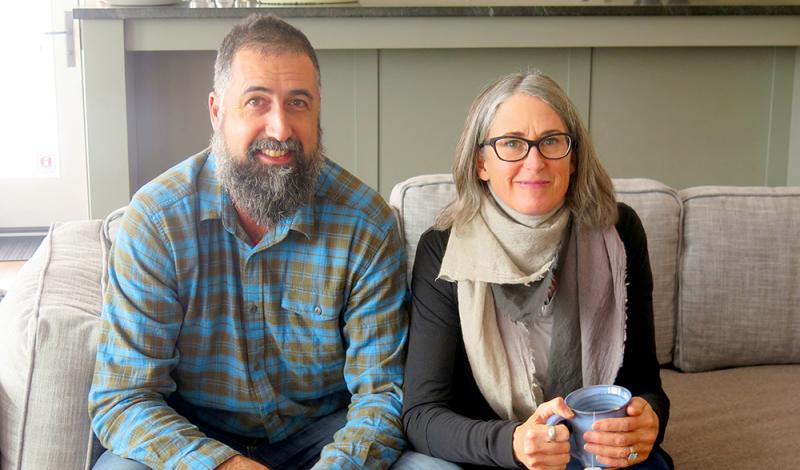Avoiding Fossil fuels with Geothermal
“Not burning fossil fuels is a big step towards trying to curb climate change,” says John Gordon, a fine home builder in Mulmer township, near Wasaga Beach, Ontario.
“I like that the AC is quiet and very gentle. Its not a blast of cold air,” says his wife Mary (MK) Lynda, a local optician. “We’re using energy out of the earth to heat and cool the house rather than other energy. So we’re not burning oil and we’re not burning propane.”
Mary and John have been in Mulmer for six years. John wanted a little more space for equipment and vehicles, so he built a larger house. In the new house he had geothermal installed. It’s a five-ton system driven by a WaterFurnace heat pump, for a 3400 square foot dwelling. They also burn a little firewood in their fireplace. John says the total monthly cost for the firewood and power is $309.
“We moved from a house that was about half the size of this one. We’re heating this house for about the same energy cost as our old house, but it’s twice the size…I think geothermal is a good answer.” They say that another big feature of geothermal is that there is no outdoor compressor. Says John: “It’s a clean install. No exhaust. No fans running.” Says Mary: “In previous houses there was always some ugly thing in the window or outside, or attached to the furnace. This is a nicer house to come home to…And the heat is coming from the ground. Its more environment friendly.”
John’s company builds fine custom homes for others, and many of them ask for geothermal. He works with Nottawasaga Mechanical and also Geothermal Solutions, a specialist company, which drills test holes first, to ensure the soil and other conditions are right for geo-exchange.
“They both have a lot of experience with geothermal..Nottawasaga Mechanical they’re a really great company and one of the things I like is that they have a 24-hour switchboard. They’ll send a guy out in a truck in a snowstorm on a Sunday night to fix you and get you back up. That’s a big plus.”
Meanwhile back at home, John’s plan is to add a four-car garage/workshop with solar panels on its roof. “We don’t know where energy prices are going in the future,” says John. “We only need about 35 kilowatts to hit net zero.”
They explain that they are also interested in electric vehicles. Mary is planning to get an electric SUV. “It has to be able to handle the roads around here.” John wants an electric pickup truck. He says: “My current truck will soon have 300,000 kilometres on it. I will have spent close to $100,000 on gas over its lifetime.” He knows that this will drop by about 75% when he electrifies. “My next vehicle will be electric.”
“I think net metering is the future. More micro solar systems on a small level, feeding the grid and so forth,” says John. “Generating power with solar energy, wind energy, home storage, that type of thing, will only become cheaper, more affordable, more mainstream moving forward. Fossil fuels is an old idea that needs to change.”











